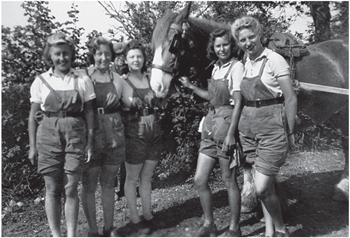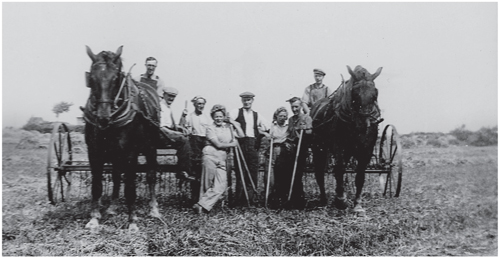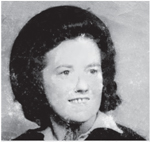Essex Land Girls (12 page)
Authors: Dee Gordon


WLA friends, human and equine, at a strawberry farm at Braintree, with only Nellie Stone identified on the left. (Courtesy of the Braintree District Museum Trust)
Irene Verlander
Apart from a few weeks billeted at Boxted, when she worked in an apple orchard, Irene was able to commute from home in Rayleigh to farms and nurseries in the Wakering area. For her, ‘the least pleasant job was muck spreading, and then having to get on the bus home when I was smelly’. She also worked at greenhouses in Wakering with other Land Girls, including
Maude Hansford
who mentioned that they regularly ‘used formaldehyde’ in this work.
Florence Rawlings
Unusually, Florence (known as Pat) worked with a farmer who bred pedigree shorthorn bulls, but she ‘was never nervous with the bulls’. He also had eighteen cows which she learned to milk ‘with a machine’ as well as ‘cleaning the cow sheds and yard’ and ‘avoiding the cowpats’. The bulls had to be ‘shampooed and groomed for shows’ and Florence even went ‘into the ring’ at show time. More usually, she had to ‘feed the pigs’ and help to process the milk through the cooler and into the churns. Her last job as a Land Girl was on another farm in Kelvedon, working with bullocks who provided manure. This was a ‘big hoeing job with other girls … very mucky’.
Doreen Morey
On her first morning, fresh from the East End, Doreen was given her heavy-duty bicycle and told to cycle from her billet in Snakes Lane, Woodford, ‘known as the School House because of the teachers who lived there’ to meet up with ‘another Land Girl at the Green’. (As Doreen then mentions Great Bentley, this was probably their village green.) She ‘started with threshing hay … following the steam engines, then bagging the grain … the chaff came out one end, the grain the other … [working with] all cereal crops: wheat, corn, oats and barley’. Finding herself ‘on top of a hay-stack in the freezing cold I didn’t know what to do …’ and she had to learn ‘to use a pitchfork … I got told off if I did it wrong. The local farmhands were not keen on helping but when they got used to us they were more affable; perhaps they felt less threatened.’ In common with others, Doreen ‘hated cutting sprouts on cold mornings’ but enjoyed ‘collecting mangels with the horse and cart [and] working with the young male farmhands’. But the dirtiest job ‘was using the chaff box, collecting the chaff waste … [resulting in] black teeth, hair and skin; [we] tied scarves over our faces to stop breathing it in … I never got used to it’. As a result, she ‘went to Writtle Agricultural College to ask for a transfer but was refused so I asked for a transfer to the Timber Corps and this was refused, too, so I said I’d “go home then” and eventually they let me transfer to the Timber Corps’.
Iris Shead
Shirt maker Iris led a very different life for her five years in the Land Army. She spent her time on dairy farms mainly in the Laindon and Witham areas. She recalled one of Lord Rayleigh’s dairy farms at Witham, and Jack Buckenham’s farm in Lower Dunton Road (Laindon) in particular, the latter farmer apparently one-time Master of the Hunt. ‘I milked by hand to start, starting at 5 a.m., and looked after the cows and the bulls, carting foodstuff from the fields … it was hard work, especially bringing the cows in from the meadow in the summer time before starting the milking.’
Amy Rogers
This was one Land Girl who liked variety:
I was on the same farm for a year after joining the WLA but it was not very busy and in a small village so I asked for a transfer and ended up on Mersea Island where the road was closed at high water … working in a market garden for six months, billeted in a large hostel with 40 girls … then [following a short unhappy stint threshing corn in Warwickshire] I moved to Stansted, mainly hoeing sugar beet, for two years … then in 1945 I moved to Thundersley for my last six months.
Lynette Vince
On her first morning in Wivenhoe, after being thrown in the deep end on her arrival the night before (see Chapter Three), Lynette remembers:
The farmer wanted us to go to the four acre field and collect the sugar beet. We got the horse out and put it in the shafts, and off we went. He said ‘the horse knows where the field is’. We got on to the cart after being told what to say for ‘start’ and ‘stop’ … but we had no idea what sugar beet looked like. When the horse stopped, we got out and picked what we hoped was beet, filled the cart, went back to the yard where the farmer said it was only half a load: ‘Go back and get a load.’ Luckily, it
was
sugar beet!
Another memorable experience was ‘getting the cows in with stars in the sky before breakfast’ for hand milking, with the milk then ‘pasteurised, bottled and delivered by the farmer’. She also spoke of ‘hoeing and stooking, with no tractors’ in evidence, and of ‘the worst job’ which was ‘cleaning out the pig sty with handkerchiefs on [our] faces to deal with the smell …
‘One morning, we were waiting in the hostel in Peldon in the pouring rain when the lorry arrived to take us to East Mersea, but as there were no barns or shelter for us, we refused and told the driver to take us back to the hostel where we had a bath and changed our wet clothes.’ The protest did not last long, because they were told that ‘strikes were illegal’ and sent back to work. However, as the ringleader, this led to Lynette subsequently being offered training as a ‘ganger’ because she was ‘the sort of person the WLA was looking for’ but she refused because she ‘didn’t want to give orders to my friends’.
Lynette recalled that the work was ‘all arable farms … including wheat and barley …’ which she preferred to an early milking experience, and she continued to work with her sister on ‘picking sugar beet, a lot of hoeing, hedging in winter and cutting down trees … working with older men who showed us what to do’. Neither of them was keen on harvest time, though, ‘all that threshing and stooking, covered in stalks’. Up to twenty girls would work in a gang in a field, with:
… different jobs on different days, early starts and late finishes with a couple of twenty-minute breaks and half hour for lunch. Sugar beet lifting was heavy work, carrying half a hundredweight at a time … Although the winters were bad, it was [better than] working in a munitions factory; that was too dangerous … When pea-picking, we worked with other local women who didn’t want us to pick too quickly because there was then less work for them.
She tried driving a tractor, but couldn’t drive in a straight line, which was a ‘shame, because that was a cushy job’.
Betty Cloughton
From her billet in Wickham Bishops, Betty:
… cycled four miles each day, morning and evening, to work for Mr Burton at Hill Broad Farm in Great Braxted, doing general farm work such as feeding and seeing to the pigs, cows, fowl, etc. as well as ploughing between apple trees with a horse. One of my fondest memories was driving my tractor to Earls Colne to the American base to pick up the pig swill, and coming back with loads of rations such as dripping, fruit and chocolate which were in short supply … I also helped out at Goat Lodge Farm, Great Totham, milking and seeing to the goats, chickens and general land work … hard work but so rewarding.
Dorothea Strange
Dorothea spoke of ‘digging ditches at a farm in Hockley … learning to drive a tractor which at one point ran away down Hambro Hill [Rayleigh], only stopped by a farm worker leaping on board … stooking and dirty work … ploughing and threshing’.

Jim and Dorothea Strange, née Nevison (centre), with co-workers. (Courtesy of the Sandra Parker Collection)
Hilda Gentry
Although Hilda’s main training had been in pest control, she ‘still had a bit of a shock’ when she saw ‘snares and traps’ being used, and was sad to find animals in the traps next day, ‘usually not dead so I had to kill them by breaking their necks or hitting them with a stick. If the rabbits had been shot – not gassed – they were used for food.’ She only did six months in pest control, because she contracted ‘dermatitis from using arsenic to mix with the bran, etc. There were no rubber gloves!’ Other duties including riding out on her ramshackle old bike to pull flax (flax was used at its most coarse for rope and string, and, at its finest, for flax linen or even a form of silk), or to ‘lay pipelines for drainage on Galleywood Common’.
‘One of the best parts of the job [was] feeding the corn into the thresher’ although the steam tackle used was old. Picking up sheaves with pitchforks and catching them with a hooked knife were all new experiences. ‘The chaff and rubbish came off into sacks which must have weighed a hundredweight, but I had to pick them up and cart them away. A filthy dirty job, but if you had been threshing you could have a bath every night.’ It seems that ‘cinders from the engine occasionally started a fire’, though nothing too serious. Hilda also ‘enjoyed the harvesting, arranging the stooks, six at a time, until they were dry, and then pitchforking them on to carts to put into Dutch barns to make into stacks’. She didn’t see her first combine harvester until ‘towards the end of the war’.
Tuition in driving a tractor came from one of the farmer’s children. ‘I was taught by an eight-year old boy!’ As for the horses, she ‘liked to ride Duke and Queenie, huge but good tempered animals, if stubborn’.
She worked for a young farmer in his twenties – Percy – ‘at Duddenhoe End near Langley, for eighteen months, but the nearest hostel was closed so I was moved to live at Codham Hall near Braintree, a mansion owned by the Courtauld family … lovely place but freezing … a breakfast of lumpy porridge, or sometimes tinned tomatoes’. There were many different farms and farmers, but the hours were always long – forty-eight to fifty per week, and ‘more at harvest time’ with a complete absence of toilets during the working day. Another memory is of:
… cycling home in the dark in the winter. Sometimes the farmer found work indoors then, washing cars in the barns and such. Always worked Saturday mornings but sometimes went home Saturday afternoon and came back again Sunday evening on trains full of service people. Pay was around 48
s
per week, with 25
s
taken for my keep, less than the services were paid, and with no cheap fares or passes.
Rita Hoy
The pride in ‘running the first all-girl operation’ when in the Timber Corps at Langham, near Colchester, can be heard in Rita’s voice. This was a bit of an experiment and she ‘led a gang of fifteen girls … we got on fine, and did everything from clearing the undergrowth to transporting pit props to Ardleigh Railway Station [long gone]. There were two acres of pine and larch trees here, on Samuel Bensusan’s estate, the author and broadcaster.’ Rita also pointed out that she was taught ‘which trees to select. They didn’t have to be completely straight,’ and that many were made into telegraph poles, with branches ‘from a hazel bush used as toasting forks’ to toast the lunchtime sandwiches. One of her first jobs before promotion was ‘peeling bark and stacking pit props’, with men initially doing most of the sawing, cutting them into 3ft, 4ft, 5ft, 6ft and 7ft pieces. She remembered that some of these props were very heavy, especially in the spring when full of sap. By 1942, it seemed that there was not enough time to peel the bark from the wood for the pit props, which meant that ‘the miners would have had sore arms and backs as a result, working in those narrow tunnels’. There were smaller-scale tasks for members of the Timber Corps, too, such as making tent pegs, handles for tools, brooms and crosses for soldiers’ graves.
Joyce Willsher
Joyce sent information from Australia with regard to her experiences:
I was sent to Waltham Abbey to work in the nurseries growing tomatoes for over a year, at Sapsford’s in Sewardstone Road, and then came back to Southend because my mother wanted me home and my brother was in hospital … I worked on farms in Rochford, Shopland, Benfleet and Hockley, working in the fields, picking up the potatoes behind the tractor … it was back-breaking work, but I was staying in a hostel in Thundersley, with a gang of girls.

